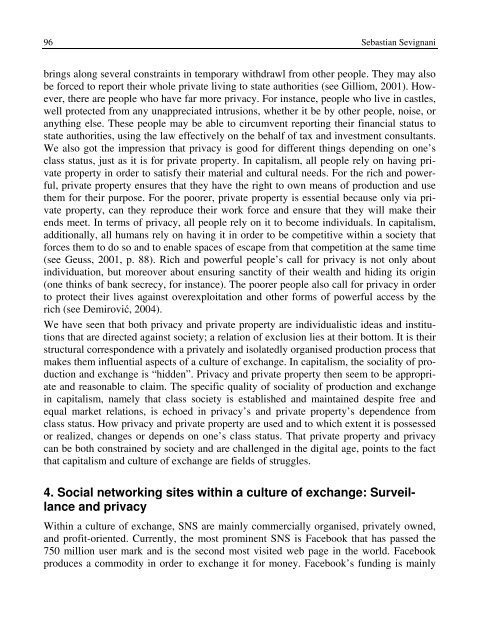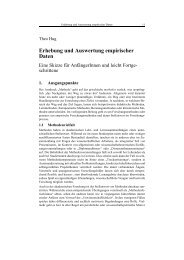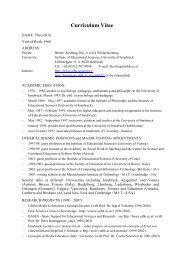Cultures and Ethics of Sharing - Universität Innsbruck
Cultures and Ethics of Sharing - Universität Innsbruck
Cultures and Ethics of Sharing - Universität Innsbruck
- Keine Tags gefunden...
Sie wollen auch ein ePaper? Erhöhen Sie die Reichweite Ihrer Titel.
YUMPU macht aus Druck-PDFs automatisch weboptimierte ePaper, die Google liebt.
96 Sebastian Sevignanibrings along several constraints in temporary withdrawl from other people. They may alsobe forced to report their whole private living to state authorities (see Gilliom, 2001). However,there are people who have far more privacy. For instance, people who live in castles,well protected from any unappreciated intrusions, whether it be by other people, noise, oranything else. These people may be able to circumvent reporting their financial status tostate authorities, using the law effectively on the behalf <strong>of</strong> tax <strong>and</strong> investment consultants.We also got the impression that privacy is good for different things depending on one’sclass status, just as it is for private property. In capitalism, all people rely on having privateproperty in order to satisfy their material <strong>and</strong> cultural needs. For the rich <strong>and</strong> powerful,private property ensures that they have the right to own means <strong>of</strong> production <strong>and</strong> usethem for their purpose. For the poorer, private property is essential because only via privateproperty, can they reproduce their work force <strong>and</strong> ensure that they will make theirends meet. In terms <strong>of</strong> privacy, all people rely on it to become individuals. In capitalism,additionally, all humans rely on having it in order to be competitive within a society thatforces them to do so <strong>and</strong> to enable spaces <strong>of</strong> escape from that competition at the same time(see Geuss, 2001, p. 88). Rich <strong>and</strong> powerful people’s call for privacy is not only aboutindividuation, but moreover about ensuring sanctity <strong>of</strong> their wealth <strong>and</strong> hiding its origin(one thinks <strong>of</strong> bank secrecy, for instance). The poorer people also call for privacy in orderto protect their lives against overexploitation <strong>and</strong> other forms <strong>of</strong> powerful access by therich (see Demirović, 2004).We have seen that both privacy <strong>and</strong> private property are individualistic ideas <strong>and</strong> institutionsthat are directed against society; a relation <strong>of</strong> exclusion lies at their bottom. It is theirstructural correspondence with a privately <strong>and</strong> isolatedly organised production process thatmakes them influential aspects <strong>of</strong> a culture <strong>of</strong> exchange. In capitalism, the sociality <strong>of</strong> production<strong>and</strong> exchange is “hidden”. Privacy <strong>and</strong> private property then seem to be appropriate<strong>and</strong> reasonable to claim. The specific quality <strong>of</strong> sociality <strong>of</strong> production <strong>and</strong> exchangein capitalism, namely that class society is established <strong>and</strong> maintained despite free <strong>and</strong>equal market relations, is echoed in privacy’s <strong>and</strong> private property’s dependence fromclass status. How privacy <strong>and</strong> private property are used <strong>and</strong> to which extent it is possessedor realized, changes or depends on one’s class status. That private property <strong>and</strong> privacycan be both constrained by society <strong>and</strong> are challenged in the digital age, points to the factthat capitalism <strong>and</strong> culture <strong>of</strong> exchange are fields <strong>of</strong> struggles.4. Social networking sites within a culture <strong>of</strong> exchange: Surveillance<strong>and</strong> privacyWithin a culture <strong>of</strong> exchange, SNS are mainly commercially organised, privately owned,<strong>and</strong> pr<strong>of</strong>it-oriented. Currently, the most prominent SNS is Facebook that has passed the750 million user mark <strong>and</strong> is the second most visited web page in the world. Facebookproduces a commodity in order to exchange it for money. Facebook’s funding is mainly








